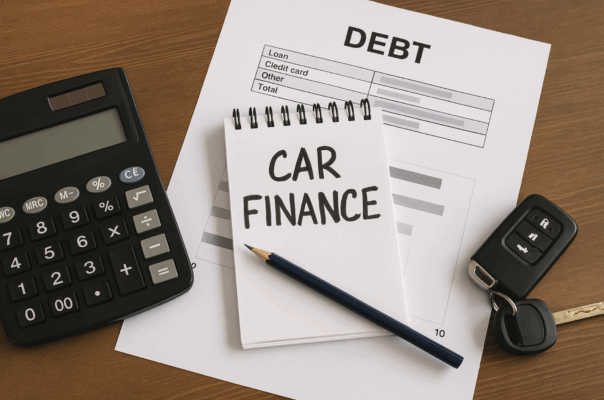How to Manage Debt When You’re Paying Off Car Finance
For free & impartial money advice you can visit MoneyHelper. We work with The Debt Advice Service who provide information about your options. This isn’t a full fact-find, some debt solutions may not be suitable in all circumstances, ongoing fees might apply & your credit rating may be affected.

For free & impartial money advice you can visit MoneyHelper. We work with The Debt Advice Service who provide information about your options. This isn’t a full fact-find, some debt solutions may not be suitable in all circumstances, ongoing fees might apply & your credit rating may be affected.
Juggling different debts can sometimes feel like playing a game where the rules keep changing. One minute it looks like everything’s under control, and the next an unexpected bill or payment reminder unsettles the whole balance. When a car finance agreement is part of that picture, the pressure often feels heavier than with other commitments.
Unlike a credit card, where missing a payment usually means extra charges and a mark on your credit record, car finance comes with a more immediate consequence. Fall too far behind, and the lender could have the right to take the car back. That’s a really scary thought when you’re already stretched thin, and it’s why car finance has to be handled differently to other debts.
In this article, we’ll explore exactly how car finance fits into the bigger picture of debt, the risks if repayments start to slip, and the options available if you reach a point where the agreement no longer works for you
Here’s what we’ll cover:
- How car finance works
- The risks of falling behind when you already have other borrowing
- Practical ways to keep payments under control
- What voluntary termination means and when it might be useful
- Alternatives if repayments don’t fit your budget
- How to approach car finance differently in the future
- Where to turn for help if the situation becomes overwhelming
How Car Finance Works and Why It’s Different
Before we get into the risks of falling behind or the steps you can take to manage payments, it helps to understand what car finance actually is and how it sits alongside other types of borrowing. A lot of people sign agreements at the dealership without really breaking down the details, and only later discover how different these contracts are from a credit card or an overdraft.
Car finance has become the standard route into car ownership for millions of drivers. Instead of saving to pay outright, people spread the cost over several years, usually with interest added. The most common products are hire purchase (HP), personal contract purchase (PCP) and standard personal loans.
With HP, you make monthly payments until the whole balance is cleared, and the car becomes yours at the end. PCP is slightly different: the instalments cover the car’s depreciation rather than its full value, and at the end you can either hand it back or pay a large final ‘balloon’ sum if you want to keep it. A personal loan is separate from the car itself: you borrow the money from a lender, buy the car outright, and then repay the loan.
What really sets this apart from most other debts is that car finance is secured against the vehicle itself. Credit cards or overdrafts are unsecured- miss a payment and the lender can chase you, but they can’t take your possessions. With secured debt, like car finance, the lender can repossess the asset to recover the money owed. That’s not just a line in the contract, it’s a real and immediate risk worth understanding. Government guidance is clear that secured creditors can legally reclaim secured property in these circumstances

The Reality of Fixed Monthly Commitments
Car finance can be a real lifeline when buying a vehicle outright simply isn’t possible, giving people the chance to spread the cost into manageable installments rather than facing a huge upfront expense. The challenge comes from the fact that those installments are fixed from the moment you sign the agreement, and they don’t change if your income dips, your working hours shift, or another unexpected bill takes you by surprise.
That certainty can feel reassuring at first, because you always know what to expect, but it can also leave little room to manoeuvre when life becomes unpredictable. For anyone with irregular earnings, or even those on a steady wage who are suddenly hit with something like a repair bill or higher insurance, the monthly payment can quickly feel harder to accommodate.
With no real flexibility built into the agreement, car finance naturally becomes one of the core expenses that has to be planned around carefully. Once you recognise that the payment won’t bend to fit your circumstances, it becomes clear why it really needs to be built firmly into your budget. The next step is looking at how to manage that balance in practice, and how to keep car finance from colliding with your other outgoings.
Staying on Top of Car Payments and Other Debts
When money is stretched, it’s really important to start thinking about which payments really need to be kept up and which ones can wait a little longer. Some commitments carry much more weight than others, and making sure they are covered first can save you from bigger problems later on. Housing costs, council tax, utilities, and car finance all fall into this group, because missing them has an immediate knock-on effect. Other borrowing (i.e store cards or personal loans) are still important but they usually don’t trigger the same level of pressure straight away.
Once you’ve worked out which payments sit at the top of the pile, the next step is building a budget that reflects this priority order. There are lots of different ways of approaching debt repayment, and the right one often depends on what feels most manageable for you:
- Some people like the snowball method, where smaller balances are cleared first to build momentum.
- Others prefer the avalanche method, tackling the highest-interest debts before anything else to save money long-term.
Whichever approach you choose, the key is making sure essentials like car finance are built in from the start. To help, we’ve even put together this helpful debt repayment tracker spreadsheet.
It’s also worth reaching out to your lender if you’re struggling to meet the payments. Finance companies are usually more willing to adjust terms than risk going through the repossession process, which is costly for them too. In some cases, they may agree to a temporary reduction or an extension of the loan term, giving you some breathing space to get back on track.
Voluntary Termination: Ending an Unaffordable Agreement
Even with the best budgeting efforts, there are times when keeping up with car finance simply isn’t realistic. Income changes, unexpected costs, or long-term financial strain can all leave you with payments that just don’t fit your circumstances anymore. When this happens, it’s important to know that the law gives you a clear way out.
Under the Consumer Credit Act, you have the right to end certain finance agreements early through what’s known as voluntary termination. This option is available once you’ve repaid at least half of the total amount owed on the contract. It’s worth pointing out that ‘total’ doesn’t just mean the monthly installments; it also includes any fees and, in the case of PCP, the balloon payment at the end. That means you might not reach the halfway point as quickly as you’d expect.
For many people, voluntary termination can come as a huge relief as it allows you to hand the car back and walk away without being chased for the remaining balance- avoiding the cycle of arrears and collection letters. However, there are trade-offs unfortunately: you lose the car itself, and some lenders may look less favourably on applications if they see you’ve ended a previous agreement this way.

Alternatives If You Can’t Afford Payments
Voluntary termination isn’t the only path if you’re worried about going down that route. Some people find it makes more sense to restructure their existing agreement, extending the term to bring down monthly instalments. Others decide to sell the car, provided it’s worth more than the outstanding finance, which can clear the debt in one go.
Debt consolidation is another route sometimes considered: rolling several debts, including car finance, into a single new loan. This can simplify repayments, but it’s not suitable for everyone and should be approached cautiously since it can extend the debt over a longer period or come with higher costs overall.
What matters most is getting to grips with these options before arrears spiral, because the earlier you act, the more choices you usually have.
Finding a Better Car Finance Deal in the Future
Once the immediate stress of repayments is under control, it’s worth looking ahead to how you approach car finance in the future. Many people end up tied into agreements that seemed fine on paper but quickly become restrictive when circumstances change. Taking more time to plan at the start can make a big difference to how manageable those payments feel in the long run.
That might mean setting your sights on instalments that sit comfortably within your budget, avoiding balloon payments that will be difficult to cover later, and comparing more than one offer before you sign. The most reliable way to do this is through a regulated broker, where you can be confident that the deals you’re reviewing are genuine and tailored to your circumstances.
Exploring car finance with ChooseMyCar, a trusted FCA-regulated broker, makes this process far easier. Not only can you compare a wide range of options in one place, but you can also use repayment calculators to see how each agreement would look month by month. Having that level of transparency upfront helps you avoid taking on finance that stretches your budget too far and gives you the confidence that the deal you choose is one you can realistically afford.
Where to Turn for Help if Things Feel Overwhelming
Sometimes, even with budgeting, negotiation, or looking at alternatives, repayments can still feel impossible. At that stage, getting professional debt advice is definitely the best thing you can do.
Independent charities such as StepChange, National Debtline, and Citizens Advice offer free and confidential advice. They can talk you through formal debt solutions, help you understand how car finance fits into the bigger picture, and make sure you’re aware of every option available to you.
The earlier you ask for guidance, the more choice you usually have. Taking that step can help stop arrears from spiralling and give you a clearer path to regaining control.
